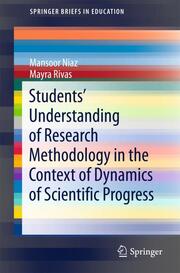Detailansicht
Students Understanding of Research Methodology in the Context of Dynamics of Scientific Progress
SpringerBriefs in Education
ISBN/EAN: 9783319320397
Umbreit-Nr.: 9165123
Sprache:
Englisch
Umfang: xii, 58 S., 6 s/w Illustr., 58 p. 6 illus.
Format in cm:
Einband:
kartoniertes Buch
Erschienen am 27.04.2016
Auflage: 1/2016
- Zusatztext
- This book discusses how to improve high school students' understanding of research methodology based on alternative interpretations of data, role of controversies, creativity and the scientific method, in the context of the oil drop experiment. These aspects form an important part of the nature of science (NOS). The study reported in this volume is is based on a reflective, explicit and activity-based approach to teaching nature of science (NOS) that can facilitate high school students' understanding of how scientists elaborate theoretical frameworks, design experiments, report data that leads to controversies and finally with the collaboration of the scientific community a consensus is reached. Most students changed their perspective and drew concept maps in which they emphasized the creative, accumulative, controversial nature of science and the scientific method.
- Kurztext
- This book discusses how to improve high school students' understanding of research methodology based on alternative interpretations of data, role of controversies, creativity and the scientific method, in the context of the oil drop experiment. These aspects form an important part of the nature of science (NOS). The study reported in this volume is is based on a reflective, explicit and activity-based approach to teaching nature of science (NOS) that can facilitate high school students' understanding of how scientists elaborate theoretical frameworks, design experiments, report data that leads to controversies and finally with the collaboration of the scientific community a consensus is reached. Most students changed their perspective and drew concept maps in which they emphasized the creative, accumulative, controversial nature of science and the scientific method.
